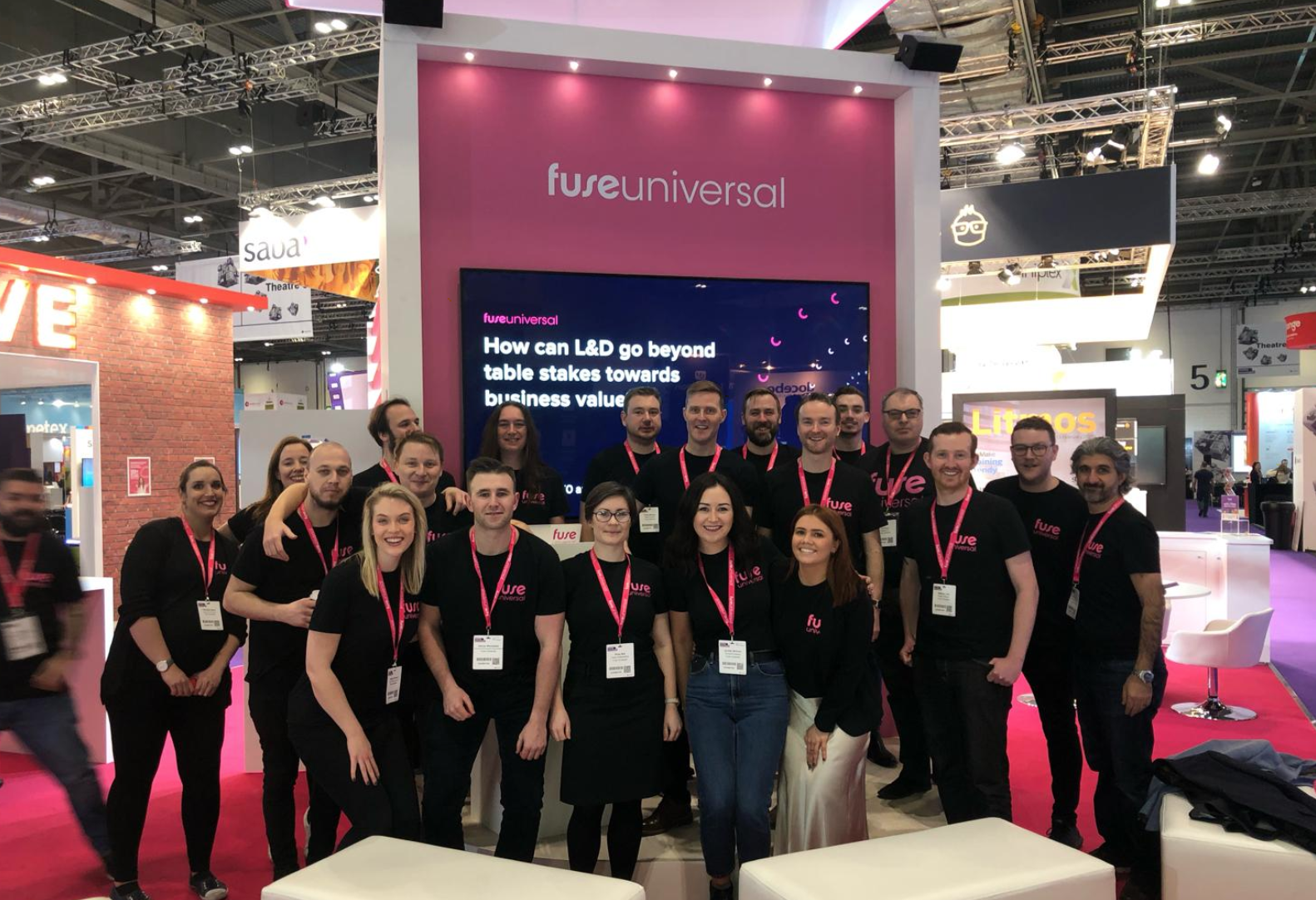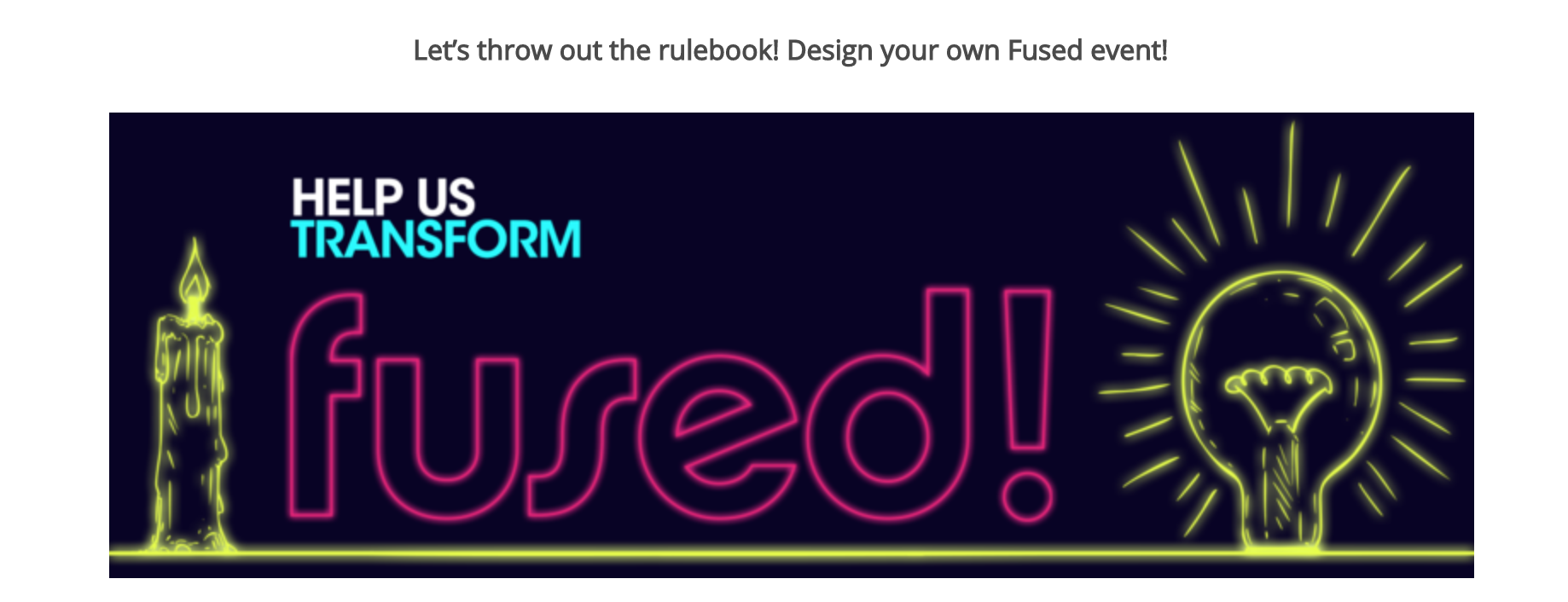
Six months ago, I, along with lots of other event managers felt comfortable in our bubble of running events the way we had been for years. Networking, keynotes, large groups gathered around impressive stands - you know how they go.
And then a few months ago, it all changed. COVID-19 hit, and the events industry fell silent.
As someone who loves organising events, I’ve been reflecting on what the modern-day event manager’s role looks like and whether it will cease to exist in the future.

Rewind to my second month of joining Fuse Universal, April 2019, I helped to organise their biggest customer event - Fused! It took months of hard work.
I still remember the buzz as everyone took their seats in the auditorium in the morning, and the excitement as we handed our last Fusie award to one of our brilliant customers… In a what seemed like a blink of an eye we were then all relaxing during networking drinks at the end of the day.
I’d planned every minor detail and it was a joy to see it all come to life. Of course, it was also nerve-racking.
But there is nothing that compares to those feelings - the highs and lows of planning and executing the perfect event.
Like many of you, I’ve been racking my brain as to how those experiences we meticulously craft can be re-created digitally. It isn’t just a matter of moving everything online. They’re completely different experiences.
I’ve spoken with friends and colleagues about what makes in-person events so special, how to extract that ‘specialness’.
[DISCLAIMER] I don't have all the answers, and what’s so wonderful about that is that I'm pretty sure no one else does either. So let’s learn together.
I’d love to hear what you’ve learned over the last few months too so please leave a comment or drop me an email at jessie.parker@fuseuniversal.com.
Here are some of the lessons I've learnt over the last few months 👇🏼
1. Take time to reflect on the pastI’ve found that one of the amazing things about lockdown has been having the time to reflect. Both personally and professionally.
I’ve given a lot of thought to what's worked well at the events I’ve attended and hosted. And I’ve come to the conclusion that one of the main reasons we all attend and put on events is to connect with, learn from and teach others.
During my reflections, I’ve also considered what hasn’t worked, which can sometimes be the hardest. What sessions weren’t so good, and why?
For example, in the physical world, an unengaging talk or workshop could be remedied by a face-to-face chat to clarify questions afterwards. Digitally, this isn’t the case. Once your attendeeS step away from their laptops, that’s it, they’re gone.
So take the time to reflect on which aspects of your physical events should and shouldn’t be incorporated into a digital event.
Establish a POST
I’ve found it’s been important to sit down and take a moment to understand what the purpose and goals are of an event. Just like what you’d do if you were planning a physical one.
I like to use a framework called POST. It’s typically used when planning meetings but I find it works really well when framing your event so give it a try!
POST stands for:
Here is a PDF document that gives a little more information.
I think for many of us, doing digital events for the first time, it's so important to understand why you’re putting the event on and what you hope to accomplish from it.
Would the purpose be the same as your old in-person events? Or has it shifted as a result of your attendees needs changing? These are really important questions to ask.
Too often with events, and other large projects, the magnitude of the task can be overwhelming and cloud your thinking.
So make sure you take a minute to sit down and really think about your event using the POST framework (or any others you’re used to using).
2. Involve internal stakeholders early
Another lesson is to involve internal stakeholders early and throughout the process.
No one team completely owns an event. It’s important to give others the chance to have their say and get involved. They will have other ideas you haven’t thought of yet - trust me on this!
When thinking about our upcoming digital events, it’s been really important for me to include my colleagues who are working with our customers (and prospects) every day. Over the last week I’ve spoken to a number of colleagues and they’ve been able to offer incredible insight into what our events should look like.
So make your digital event planning a team activity.
Talking of people, make sure you take the time to talk to people who are outside of your organisation to find out how they’re thinking about digital events.
My amazing colleague Ilona Brannen sets herself a goal to speak to at least two external people a week. This helps her ensure she’s always keeping up to date with what's going on in other peoples worlds.
I’ve been doing a lot of research and reading around best practices for events, seeing how other people have made it happen and that’s been invaluable. I came across this great tip sheet by learning consultancy experts - Tagoras - 20 Tips for Successful Virtual Events.
There are also a number of free online events you can attend, so get out there and take a look at how others are doing it...Steal with pride!
In my opinion, the most important indicator of a successful event is whether your attendees come away feeling as though they’ve gotten value. Whether that’s learning something new or building relationships with others in your network.
It can be very easy to assume that we think we know what attendees want from our events. So why not just ask them?
Remember the Fused! event I mentioned earlier? Well, this year I’m planning a digital version.
So I shared a post on our Fuse site asking our customers what they’d like to see as part of our annual event. Given the fact we won’t be doing it in-person, we saw this as an opportunity to throw out the rulebook. We were open to all sorts of ideas.

I know most companies will say their customers are the best but to me, Fuse customers beat them all.
We’ve been flooded with ideas, suggestions and feedback on what they’d like to get out of the event. And I can guarantee we’d have missed a lot of those ideas had we just assumed we knew all the answers.
There is no point organising an event if you’re not putting the needs of your attendees at the heart of it.
Not only has their input given us content ideas for our event, but the whole business has been given insight into the type of content our customers would like more of in general. And every department at Fuse loves more customer insights!
If you’ve taken the time to ask your customers what they’d like as part of your event, GET CREATIVE AND MAKE IT HAPPEN!
I’m not sure whether it’s just the rebellious nature of Fuse customers, but they love to join us for experiments and partner with us to see how projects might turn out. This means that the end result is something everyone has had a hand in creating, and often those are the most valuable and memorable experiences.
Why not invite a small group of your customers onto a call and ask them to share ideas they’ve tried with their events?
Get creative with the theme of your event.
I think we’re all pretty sick of talking about COVID-19 so have a think about the future and what amazing things will emerge after our lockdown. Test out different session lengths and work with different speakers. Don’t just have the same group of people speaking, give some new voices a stage to shine on!
What an exciting time we’re all in. I mean it’s also scary and uncertain for many of us at times. But we’re at an incredible crossroads within the events industry to really revolutionise what the word ‘events’ means.
What was once the norm has disappeared, and many predict we won’t return to what we once knew, so get out there and try different things.
You may have seen the recent LinkedIn Live I did with our wonderful customer Viivi Vepsa from Demant. I’m going to share a little secret. That was an experiment. We didn’t know if anyone was going to show up. And it wasn’t perfect, but we took a leap of faith and tried something new, not worried about whether it would go wrong.
It was a success because we learnt something, and next time it will be even better. And luckily, people did show up!
Speaking of next time, on Tuesday 14th July at 4pm BST, we’ll be hosting our next LinkedIn Live with the dynamic duo Topher Olsen and Ryan DeGroot. My colleague and friend Nihal Salah will be hosting it and they’ll be talking about User generated content and engagement. (make sure you follow Fuse Universal on LinkedIn so don’t miss it).
I'd encourage all you event managers out there to do the same. Playing it safe and trying to take your physical event and replicating it online just won’t work. So experiment. And if you get it wrong, learn from the experience and move onto the next experiment.
We are all learning together so take that leap of faith!
I hope these lessons have given you some insight into the learning journey that I’ve been on over the last few months. Whilst I don’t believe they’re anything new or groundbreaking. But I do think it's important to share and take time to reflect on the journey we’re all going on at the moment.
I’d love to hear about your experience and what you’ve learned over the past few months.
So leave me a comment below.
And remember, don’t worry about having all the answers (no one does). Just keep reading, listening and learning.
Because when we’re learning, we’re creating magic, and there is so much magic in events.
Register for our upcoming webinar below 👇
© 2022 Fuse Universal - All Rights Reserved
Comments (5)